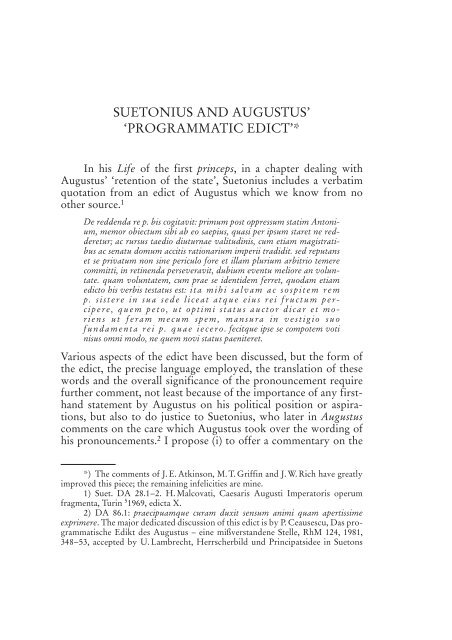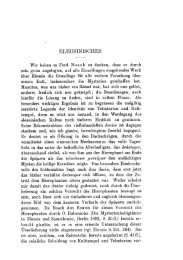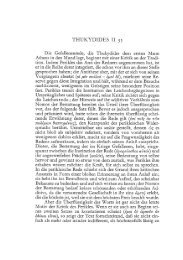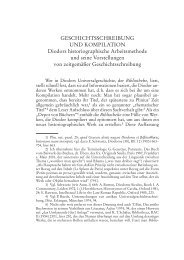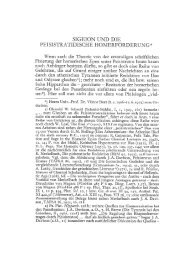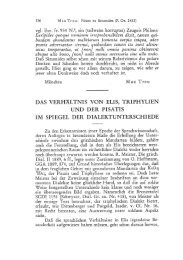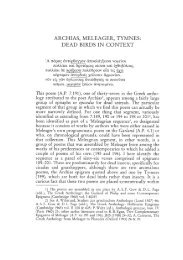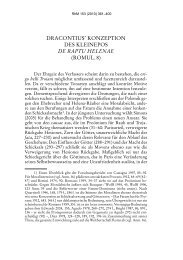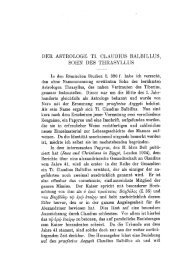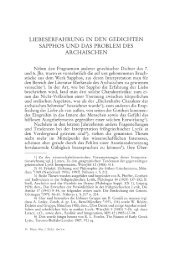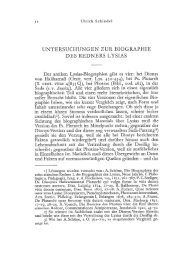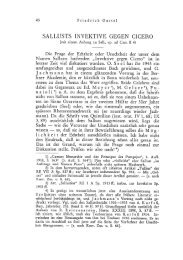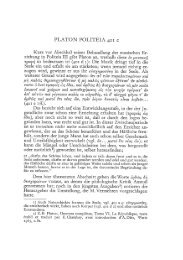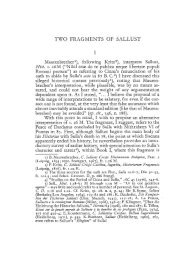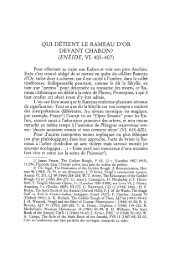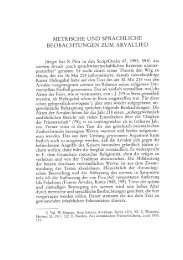SUETONIUS AND AUGUSTUS' 'PROGRAMMATIC EDICT'*
SUETONIUS AND AUGUSTUS' 'PROGRAMMATIC EDICT'*
SUETONIUS AND AUGUSTUS' 'PROGRAMMATIC EDICT'*
You also want an ePaper? Increase the reach of your titles
YUMPU automatically turns print PDFs into web optimized ePapers that Google loves.
<strong>SUETONIUS</strong> <strong>AND</strong> AUGUSTUS’<br />
‘PROGRAMMATIC EDICT’*<br />
In his Life of the first princeps, in a chapter dealing with<br />
Augustus’ ‘retention of the state’, Suetonius includes a verbatim<br />
quotation from an edict of Augustus which we know from no<br />
other source. 1<br />
De reddenda re p. bis cogitavit: primum post oppressum statim Antonium,<br />
memor obiectum sibi ab eo saepius, quasi per ipsum staret ne redderetur;<br />
ac rursus taedio diuturnae valitudinis, cum etiam magistratibus<br />
ac senatu domum accitis rationarium imperii tradidit. sed reputans<br />
et se privatum non sine periculo fore et illam plurium arbitrio temere<br />
committi, in retinenda perseveravit, dubium eventu meliore an voluntate.<br />
quam voluntatem, cum prae se identidem ferret, quodam etiam<br />
edicto his verbis testatus est: ita mihi salvam a c sospitem rem<br />
p. sistere in sua sede liceat atque eius rei fructum percipere,<br />
quem peto, ut optimi status auctor dicar et moriens<br />
ut feram mecum spem, mansura in vestigio suo<br />
fundamenta rei p. quae iecero. fecitque ipse se compotem voti<br />
nisus omni modo, ne quem novi status paeniteret.<br />
Various aspects of the edict have been discussed, but the form of<br />
the edict, the precise language employed, the translation of these<br />
words and the overall significance of the pronouncement require<br />
further comment, not least because of the importance of any firsthand<br />
statement by Augustus on his political position or aspirations,<br />
but also to do justice to Suetonius, who later in Augustus<br />
comments on the care which Augustus took over the wording of<br />
his pronouncements. 2 I propose (i) to offer a commentary on the<br />
*) The comments of J. E. Atkinson, M. T. Griffin and J. W. Rich have greatly<br />
improved this piece; the remaining infelicities are mine.<br />
1) Suet. DA 28.1–2. H. Malcovati, Caesaris Augusti Imperatoris operum<br />
fragmenta, Turin 5 1969, edicta X.<br />
2) DA 86.1: praecipuamque curam duxit sensum animi quam apertissime<br />
exprimere. The major dedicated discussion of this edict is by P. Ceausescu, Das programmatische<br />
Edikt des Augustus – eine mißverstandene Stelle, RhM 124, 1981,<br />
348–53, accepted by U. Lambrecht, Herrscherbild und Principatsidee in Suetons
182 David Wardle<br />
individual words and phrases which comprise the decree, on the<br />
basis of this (ii) to propose a translation and finally (iii) to discuss<br />
the probable context and significance of the edict.<br />
I. Commentary<br />
Ita. Ita leading onto an ut clause for the purposes of asseveration<br />
– of the contents of the ut clause rather than strict result –<br />
is a feature of Roman prayers often with ita me di ament, ut ... (e.g.<br />
Plaut. Bacch. 892, Merc. 762). 3<br />
Mihi. The use of the first person is appropriate to an edict,<br />
that is a pronouncement based on magisterial authority on a question<br />
considered within his competence: the magistrate or emperor<br />
spoke in the first person. 4 The addressees are unspecified, but can<br />
be understood as all those under Augustus’ authority: in the context<br />
that may mean all citizens of the empire, 5 or more likely a<br />
limited group, for example, the inhabitants of Rome. Although<br />
edicts in principle had no specific addressee, before the tetrarchic<br />
period there is little evidence of imperial edicts as a means of general<br />
communication to the empire rather than as responses to specific<br />
communities, individuals or requests. 6<br />
While mihi and the tense of liceat may indicate that Suetonius<br />
is providing us with a quotation in oratio recta consistent with an<br />
Kaiserbiographien, Bonn 1984, 135 and O. Wittstock, Sueton. Kaiserbiographien,<br />
Berlin 1993, 498. Much basic groundwork was done by W. Weber, Princeps: Studien<br />
zur Geschichte des Augustus, Stuttgart/Berlin 1936, 27 nn. 134–7, but now all treatments<br />
must deal with K. M. Girardet, Das Edikt des Imperator Caesar in Suetons Augustusvita<br />
28,2. Politisches Programm und Publikationszeit, ZPE 131, 2000, 231–43.<br />
3) See the collection of examples by G. Appel, De Romanorum precationibus,<br />
Gießen 1909, 177–8; Girardet (above, n. 2) 234: “einer emphatischen Bekräftigungsformel”.<br />
4) M. Benner, The Emperor Says: Studies in the Rhetorical Style in Edicts<br />
of the Early Empire, Gothenburg 1975, 26. Cf. M. Kaser, Zum Ediktsstil, in: H. Niedermeyer<br />
and W. Flume (edd.), Festschrift für Fritz Schulz, Weimar 1951, vol. ii,<br />
51–2.<br />
5) Cf. A. von Premerstein, Vom Werden und Wesen des Prinzipats, München<br />
1937, 124: “einem Edikt an die Bürgerschaft”.<br />
6) See F. G. B. Millar, The Emperor in the Roman World, London 1977, 252–<br />
9. However, Jos. AJ 19.291 and P. Fayum 20 preserve provisions for empire wide display,<br />
and other Augustan edicts preserved via literary texts (Plin. Ep. 10.83, Macrob.<br />
Sat. 1.10.23) relate to subject matter that would have an empire wide relevance.
Suetonius and Augustus’ ‘Programmatic Edict’<br />
imperial edict, the two words are more precisely part of a vow (see<br />
on Liceat), of which Suetonius has omitted the condition(s) which<br />
Augustus imposed on himself and which would constitute its fulfilment.<br />
Salvam ac sospitem. The combination of the cognate adjectives<br />
salvus and sospes is found from Plautus onwards: filium /tuom<br />
modo in portu Philopolemum vivom, salvom et sospitem /vidi<br />
(Capt. 872–4); eamque eventuram exagogam Capuam salvam et<br />
sospitem (Rud. 631); Lucilius, sospitat, salut inpertit plurima et<br />
plenissima (739 Marx), provides the only other example from Republican<br />
literature, but from the imperial period we have Ovid,<br />
namque meis sospes multum cruciatibus aufers, /atque sit in nobis<br />
pars bona salva facis (Pont. 3.2.3. Cf. the prayer which concludes<br />
the Epicedion Drusi, 472–4: parsque tui partus sit tibi salva prior;<br />
/est coniunx, tutela hominum, quo sospite vestram, /Livia, funestam<br />
dedecet esse domum) and two acclamations of Domitian by<br />
Martial (Ep. 2.91.1–2: rerum certa salus, terrarum gloria, Caesar, /<br />
sospite quo magnos credimus esse deos; 5.1.8: o rerum felix tutela salusque,<br />
/sospite quo gratum credimus esse Iovem). These parallels<br />
are sufficient to demonstrate that Augustus carefully chose the pair<br />
of adjectives for its archaic and religious associations and thus for<br />
the solemnity it imparts to his words. Benner notes the use of alliteration,<br />
which is marked, especially in this opening phrase, and<br />
attributes it to the elevated style Augustus has espoused for this<br />
particular, important edict which served as a manifesto of his political<br />
aims. 7 This is fine, as far as it goes, but hardly brings out the<br />
religious nuance of the words, which is wholly appropriate to the<br />
specific context that Suetonius’ compotem voti suggests. 8 Although<br />
the only other use of the expression compos voti (Cal. 13) by<br />
Suetonius himself is clearly hyperbolic and should not be forced,<br />
the religious language has parallels in contemporary documents<br />
7) Benner (above, n. 4) 81: “the reference to renown and the survival of his lifework<br />
after his own death is a feature of pathos”. F. Hickson, Roman Prayer Language:<br />
Livy and the Aeneid of Vergil, Stuttgart 1993, 80 gives examples of the alliterative<br />
combination of salvus and servare in vows for the preservation of the state and/or<br />
emperor. On alliteration as a feature of Roman prayer language, see Appel (above,<br />
n. 3) 160–2 and on the cumulation of virtual synonyms, Appel (above, n. 3) 141–5.<br />
8) R. Hanslik, Die Augustusvita Suetons, WS 67, 1954, 132: “Sueton unterstreicht<br />
diese Worte noch durch die abschließende Feststellung: fecit . . . paeniteret”.<br />
183
184 David Wardle<br />
(IGRRP 4.251) and, even if formal public vota are not meant, individual<br />
examples are not excluded. At DA 58.2 Suetonius quotes<br />
Augustus’ words compos factus votorum meorum, p. c., quid habeo<br />
aliud deos immortales precari . . . in his response to Valerius Messalla’s<br />
proposal that he be given the title Pater Patriae. This is probably<br />
a comparable context to our edict. In all other instances<br />
when Suetonius uses votum it bears the technical sense of a vow<br />
undertaken, by individual or community, which would be repaid<br />
(DJ 85, DA 57.1, 58.1, 59, 97.1, Tib. 38, 54.1, Cal. 6.1, 14.2, 27.2, Cl.<br />
45, N 46.2). Suetonius’ votum should probably be understood as<br />
‘vow’ and not ‘wishes’.<br />
Rem p(ublicam). There is “a notoriously elastic range of<br />
uses” for this term, 9 and in an unembodied quotation such as this<br />
it is particularly difficult to pin down Augustus’ usage. Edwin<br />
Judge includes this as an example of a kind of personification best<br />
translated as ‘the country’, while Edwin Ramage prefers “a general<br />
term for government or the Roman state”. 10 Augustus’ use of res<br />
publica in other public documents, notably his Res Gestae, is also<br />
very difficult to pin down, indeed any ambiguity there may well be<br />
deliberate. 11 Other official documents, such as the Actium inscrip-<br />
9) M. Schofield, Cicero’s definition of Res Publica, in: J. G. F. Powell (ed.),<br />
Cicero the Philosopher, Oxford 1995, 66 (= M. Schofield, Saving the City: Philosopher-Kings<br />
and other Classical Paradigms, London 1999, 180). In general, see<br />
H. Drexler, Res publica, Maia 9, 1957, 245–81, R. Stark, Res publica, in: H. Oppermann<br />
(ed.), Römische Wertbegriffe, Darmstadt 1967, 42–110 and V. Ehrenberg,<br />
Some Roman concepts of state and empire, in: Man, State and Deity: Essays in<br />
Ancient History, London 1974, esp. 108–12. For the Augustan period, see E. A.<br />
Judge, Res Publica Restituta: A Modern Illusion, in: J. A. S. Evans (ed.), Polis and<br />
Imperium: Studies in Honour of Edward Togo Salmon, Toronto 1974, esp. 280–5.<br />
For the term as a myth subject to various interpretations, N. K. Mackie, Res publica<br />
restituta: a Roman Myth, in: C. Deroux (ed.), Studies in Latin Literature and<br />
Roman History, vol. iv, Brussels 1986, esp. 328–34. Ceausescu (above, n. 2) 351<br />
stresses a concrete understanding of the word, the property connotations of res populi,<br />
following H. P. Kohns, Res Publica - Res Populi, Gymnasium 77, 1970, 392–<br />
404. For a general treatment of Suetonius’ vocabulary for ‘the state’, see G. Alföldy,<br />
Römisches Staats- und Gesellschaftsdenken bei Sueton, Ancient Society 11/12,<br />
1980/81, 361–4 and below p. 196.<br />
10) Judge (above, n. 9) 302; E. S. Ramage, The Nature and Purpose of Augustus’<br />
“Res Gestae”, Stuttgart 1987, 60.<br />
11) Ramage (above, n. 10) 38–40 argues that the seven occurrences of res<br />
publica in Res Gestae each have a republican connotation, but his insistence (39<br />
n. 69) that “Augustus is talking here about activities in 43 B. C. when the republic
Suetonius and Augustus’ ‘Programmatic Edict’<br />
tion, pro [r]e p[u]blic[a], 12 and the dedication by the Senate and<br />
people in 29 B. C., re publica conservata, on a triumphal arch can<br />
similarly bear more than one interpretation. 13<br />
Sistere. While examples of the expression rem publicam (vel<br />
sim.) sistere exist and may be relevant (cf. Cic. Verr. 2.3.223: qui rem<br />
publicam sistere negat posse nisi ad equestrem ordinem iudicia<br />
referantur; Livy 3.20.8: non ita civitatem aegram esse, ut consuetis<br />
remediis sisti possit; Virg. Aen. 6.857–8: hic [Marcellus] rem<br />
Romanam, magno turbante tumultu /sistet eques), 14 the key combination<br />
is salvus and sistere. Livy records a prayer of Scipio Africanus<br />
before his departure for Africa: salvos incolumesque . . . mecum<br />
domos reduces sistatis (29.27.3). Hickson questions whether<br />
Livy’s use of salvum sistere for the traditional salvum servare may<br />
not “reflect a contemporary development in religious language”<br />
(perhaps to be seen in Augustus’ words), 15 but in essence we have<br />
a time-honoured formula, although not one which is indisputably<br />
a prayer formula. In his Rudens Plautus uses the combination twice<br />
on the lips of Daemones, ego vos salvos sistam (1049; cf. Trin. 743:<br />
still existed, so that res publica can only refer to the republic” ignores amongst other<br />
considerations the range of meanings that res publica had during the Late Republic.<br />
In the words rem publicam a dominatione factionis oppressam in libertatem vindicavi<br />
(RG 1.1) it has been argued (cf. Cic. Phil. 3.1) that res publica stands not for the<br />
state but for the city of Rome and its concerns (H. Braunert, Die Gesellschaft des<br />
römischen Reiches im Urteil des Augustus, in: E. Lefèvre [ed.], Monumentum Chilionense:<br />
Studien zur augusteischen Zeit, Amsterdam 1975, esp. 41: “res publica ist<br />
vor allem noch nicht ‚eine abstrakte Idee‘ sondern ‚Objekt staatlicher Tätigkeit‘”<br />
and id., Zum Eingangssatz der Res Gestae Divi Augusti, Chiron 4, 1974, 343–58;<br />
rejected by Ramage and D. Kienast, Augustus. Prinzeps und Monarch, Darmstadt,<br />
3 1999, 179 n. 37, 417 n. 236).<br />
12) J. H. Oliver, Octavian’s Inscription at Nicopolis, AJP 90, 1960, 180;<br />
W. M. Murray and P. M. Petsas, Octavian’s Campsite Memorial for the Actian War,<br />
Philadelphia 1989, 76.<br />
13) Ramage (above, n. 10) 58–9 argues that these refer to the Republic<br />
proper. On this inscription from the arch of Augustus, see J. W. Rich, Augustus’<br />
Parthian Honours, the temple of Mars Ultor and the arch in the Forum Romanum,<br />
PBSR 66, 1998, 100–14.<br />
14) Quoted by Ceausescu (above, n. 2) 349.<br />
15) Hickson (above, n. 7) 80. However, the extant examples from the Acta<br />
Fratrum Arvalium, which comprise the vast majority of examples of these formulae<br />
and postdate Livy, do not use sistere but servare. Insufficient extracts of the Acta<br />
from Augustus’ and Tiberius’ reigns exist to permit conjecture as to a new formula<br />
under Augustus or a revision to the traditional formula under Tiberius.<br />
185
186 David Wardle<br />
neque ita ut sit data /columem te sistere illi and Virg. Aen. 2.620:<br />
tutum patrio te limine sistam) and omnia ut quidque infuere ita<br />
salva sistentur tibi (1359). In the categories of sisto in Lewis<br />
& Short our example probably belongs in A5 ‘to cause to be in<br />
certain condition’ and in the Oxford Latin Dictionary in (3) ‘to<br />
present (a person) or hand over (a thing) at the required time’ respectively.<br />
Which nuance we accept can only be decided by the<br />
wider context, in particular the following phrase, but there is no<br />
need to envisage a specifically legislative context. 16<br />
In sua sede. This expression has generally been understood<br />
in a metaphorical sense, 17 although both detailed commentators on<br />
this passage envisage a more concrete sense. Ceausescu argues that<br />
sedes rei publicae must be understood in the sense that it is in several<br />
of Cicero’s works and in Livy, as the city of Rome, and thus comprises<br />
a boast by Augustus of having thwarted the intention of<br />
M. Antonius to transfer the capital of the empire to Alexandria. 18 If,<br />
however, a metaphorical translation is adopted, e. g. ‘on its rightful<br />
base’, this could easily refer to constitutional and/or legislative action<br />
by Augustus, either with a general reference or even specifically<br />
to his claim rem publicam ex mea potestate in senatus populique<br />
Romani arbitrium transtuli of the events of 13th January 27 B. C., 19<br />
16) H. Grziwotz, Das Verfassungsverständnis der römischen Republik,<br />
Frankfurt 1985, 317–9 demonstrates that the expression rem publicam constituere,<br />
and thus the role of Octavian as triumvir rei publicae constituendae, did not mean<br />
creating a new constitution, but bringing to order the existing one.<br />
17) P. Burmann, C. Suetonii Tranquilli De Vita Caesarum, Amsterdam 1736:<br />
“pro firmo ac stabili rerum statu”; D. Ruhnken, Scholia in Suetonii vitas Caesarum,<br />
Leiden 1820: “firmus status rerum”; S. Pitiscus, C. Suetonii Tranquilli Opera,<br />
Frankfurt 1690: “sedes est bãsiw, krÆpiw. Translatum a columnis vel colossis, qui<br />
magno nisu in suam basim restituuntur”. But Girardet (above, n. 2) 235: “nicht<br />
metaphorisch zu verstehen”.<br />
18) Cf. Ehrenberg (above, n. 9) 115: “For Cicero Rome represented the state”.<br />
Prov. Cons. 34: Numquam haec urbs summo imperio domicilium ac sedem praebuisset;<br />
Leg. Agr. 1.18: sedem urbis atque imperii, 2.89: sedem novae rei publicae; Sull. 33:<br />
urbem hanc . . . sedem omnium nostri; Cat. 3.26: imperii domicilium sedesque;<br />
Rep. 2.10: hanc urbem sedem aliquando et domum summo esse imperio praebituram;<br />
Livy 5.51.2, 27.34.14. On Octavian’s successful propaganda campaign to persuade the<br />
Roman people that Antonius intended to move the capital, see e. g. P. Ceausescu,<br />
Altera Roma: l’histoire d’une folie politique, Historia 25, 1976, esp. 86–8.<br />
19) RG 34.1. On which see most recently W. Turpin, Res Gestae 34.1 and the<br />
Settlement of 27 B. C., CQ 44, 1994, 427–37.
Suetonius and Augustus’ ‘Programmatic Edict’<br />
or to a successful ending of the motus which had thrown the state<br />
into chaos. 20<br />
An attractive parallel appears in Cicero’s Pro Marcello in<br />
which Cicero sets out what he considers remains for the dictator<br />
Julius Caesar to do ut rem publicam constituas (27) and which contains<br />
much of the vocabulary appearing also in this edict. Notably,<br />
nisi haec urbs stabilita tuis consiliis et institutis erit, vagabitur modo<br />
tuum nomen longe atque late, sedem stabilem et domicilium certum<br />
non habebit (29), which must be understood metaphorically.<br />
Liceat. Well attested for prayers, indeed prominent in two<br />
other prayers by Augustus (his response to M. Valerius Messalla<br />
Corvinus’ speech conferring on him the title Pater Patriae in 2 B. C.<br />
[Suet. DA 58.2]: compos factus votorum meorum, p. c., quid habeo<br />
aliud deos immortales precari, quam ut hunc consensum vestrum ad<br />
ultimum finem vitae meae perferre liceat and in a letter to Gaius<br />
Caesar in A. D. 1: deos autem oro, ut mihi quantumcumque superest<br />
temporis, id salvis nobis traducere liceat ... [Aul. Gell. 15.7.3])<br />
and not suggestive of an oath. 21 Cicero concludes two of his extant<br />
speeches with florid prayers, or invocations, to the Capitoline Triad<br />
which reveal that licere was used in solemn vows: imploro et obtestor<br />
... mihique post hac bonos potius defendere liceat quam improbos<br />
accusare necesse sit (Verr. 2.5.189) and meque atque meum<br />
caput ea condicione devovi ut ...mihi re publica aliquando restituta<br />
liceret frui (Dom. 145). 22 Hickson notes that “his prayer (Suet. DA<br />
28.2) is particularly interesting because Augustus prays that he himself<br />
may be the agent of what was traditionally seen as a divine gift”;<br />
the conclusion to the section by Suetonius makes almost the same<br />
point: fecitque ipse se compotem voti nisus omni modo. 23<br />
20) K. M. Girardet, Politische Verantwortung im Ernstfall: Cicero, die Diktatur<br />
und der Diktator Caesar, in: LÆnaika: Festschrift für Carl Werner Müller,<br />
Stuttgart/Leipzig 1996, 226–8, demonstrates the contrast between status and motus<br />
which informs their use.<br />
21) For suggestion concerning an oath, see M. Adams, C. Suetonius Tranquillus:<br />
Divi Augusti Vita, London 1939, 122 and W. K. Lacey, Augustus and the<br />
Principate, Leeds 1996, 86.<br />
22) The parallels of vocabulary between the De-Domo-sua-passage, the<br />
audience of which was the pontifical collegium, and the Augustan vow are increased<br />
if one adds in meas sedes restitutus (145), but this, I would argue, demonstrates only<br />
the shared context of a vow, not borrowing from Cicero by Augustus.<br />
23) Hickson (above, n. 7) 81.<br />
187
188 David Wardle<br />
Eius rei. The referent of this is taken as sistere in the translation<br />
of Lacey ‘of this’. While there are examples of res with a pronoun<br />
as an emphatic periphrasis for id, which is what these translations<br />
require (e. g. Plaut. Amph. 1068), it may be more appropriate<br />
to the elevated tone and self-congratulatory note of this edict<br />
to understand res as ‘action’ or ‘achievement’, as one of Augustus’<br />
Res Gestae (cf. Rolfe’s ‘that act’).<br />
Fructum percipere. A metaphor taken from agriculture (cf.<br />
Plin. NH 15.1), ubiquitous in Cicero (e. g. Verr. 1.1.33, 2.5.77, Sull.<br />
1 and Fam. 10.32.5: quarum rerum fructum satis magnum re publica<br />
salva tulisse me putabo; cf. Caes. BG 7.27.2; Livy 45.25.9).<br />
The frequency of this metaphor may suggest either that it was<br />
‘dead’ or that it spoke powerfully to the Romans. If the latter, then<br />
building metaphors do not stand alone in the edict and sistere in sua<br />
sede, which can be taken as an image from building, as Ceausescu<br />
argues, may be understood differently.<br />
Quem peto. For the first person, see on Mihi. Augustus’<br />
desire for an excellent reputation can be seen as an example of the<br />
typical upper class Roman desire for gloria. 24<br />
Optimi. While the adjectives bonus, optimus and their cognate<br />
Optimates had a distinctive meaning in the ideological struggles of<br />
the Late Republic, those who fought for the pre-eminence of the Senate,<br />
it is not certain that Augustus is using it here in such a retrospective<br />
sense. 25 Rather a prospective sense is preferable: “no doubt<br />
this recognises that there was a status (civitatis) which was in some<br />
respects new: that was patent”. 26 For a comparable, non-constitutional<br />
use of status and an adjective in Suetonius, cf. Domitian’s<br />
foreboding concerning the reigns of Nerva, Trajan and Hadrian beatiorem<br />
post se laetioremque portendi rei publicae statum (Dom. 23.2).<br />
24) See e. g. D. C. Earl, The Moral and Political Tradition of Rome, London<br />
1967, 30.<br />
25) E.g. J. Hellegouarc’h, Le vocabulaire latin des relations et des partis politiques<br />
sous la république, Paris 1963, 495–505; esp. 498: “ce sense «conservateur»<br />
d’optimus se maintient sous l’Empire. Auguste, qui prétend restaurer la légalité<br />
républicaine, appelle sa constitution optimus status ...”. The provisional title for<br />
Cicero’s De Republica was de optimo statu civitatis et de optimo cive (Cic. QF 3.5.1–2).<br />
26) P. A. Brunt, Augustus e la respublica, in: La rivoluzione romana, Milan<br />
1982, 239.
Suetonius and Augustus’ ‘Programmatic Edict’<br />
Status. Ceausescu argues for the technical character of status<br />
meaning constitution, ‘Verfassung’, comparing Augustus’ letter to<br />
Gaius in A. D. 1 (quoted above under Liceat) and his vow in A. D.<br />
9 after the defeat of P. Quinctilius Varus, vovit et magnos ludos Iovi<br />
Optimo Maximo, si res p. in meliorem statum vertisset (Suet. DA<br />
23.2). 27 Rather, this Suetonian example highlights the key usage for<br />
this passage – in prayer or vow formulae without a constitutional<br />
sense. Livy has five examples of the formula si res publica in eodem<br />
statu . . . in the conditional clause of a vow (21.62.10, 22.9.10, 30.2.8,<br />
30.27.11, 42.28.8) and the acta of the Arval Brethren preserve examples<br />
from A. D. 27 to the 2nd c. A. D. of the formula adapted to<br />
vows to Jupiter Optimus Maximus for the emperor’s safety. 28 It<br />
is not clear whether the formula was originally specific to the<br />
censors’ vow for the well-being of the state or whether it was used<br />
more generally. 29 Denarii minted in 16 B. C., I(ovi) O(ptimo)<br />
M(aximo) S(enatus) P(opulus)Q(ue) R(omanus) V(ota) S(usceperunt?)<br />
Pr(o) S(alute) I(mp) Cae(saris) quod per eu(m) r(es) p(ublica)<br />
in amp(liore) at(que) tran(quilliore) s(tatu) e(st) (BMCRE vol. i.<br />
nos. 91–4) prove for the Augustan period the use of status in public<br />
vows. For consciousness of an etymological link between status<br />
and sistere cf. Cic. Rep. 1.49; such wordplays are a feature of<br />
Roman prayers. The use of status in the political sphere of the Late<br />
Republic is not too different in that it is predominantly general, of<br />
a condition or state of affairs, not a specific constitutional form,<br />
although in philosophical theoretical discussions it can approach<br />
the meaning of ‘state’. 30 During the early principate the term enjoyed<br />
a greater prominence because its vagueness meant that it<br />
could incorporate the changes Augustus instituted. 31 If any allusion<br />
to the language of public vows is rejected or thought to be tangential,<br />
Augustus’ use of such a general term in a delicate political<br />
context remains intelligible (cf. Macr. Sat. 2.4.8: quisquis praesen-<br />
27) Ceausescu (above, n. 2) 348. Cf. Hickson (above, n. 7) 99–100.<br />
28) See J. Scheid, Romulus et ses frères, Paris 1990, 372–4.<br />
29) Ehrenberg (above, n. 9) 107: “status is hardly ever used independently in<br />
a political sense; it means something like condition or state of affairs or constitutional<br />
structure”; cf. J. Christes, Noch einmal Cicero, De Re Publica 1,33,50: eine<br />
Replik, WJA 21, 1996/7, 221 n. 12.<br />
30) Such a use is seen in Cicero’s philosophical works (e. g. Rep. 1.33, Leg.<br />
1.15).<br />
31) See the detailed study by E. Köstermann, Status als politischer Terminus<br />
in der Antike, RhM 86, 1937, 225–40, who cites this edict (229) as evidence.<br />
189
190 David Wardle<br />
tem statum civitatis commutari non volet, et civis et vir bonus est). 32<br />
Later Seneca can call rule by a just king optimus civitatis status<br />
(Ben. 2.20.2), but that owes more to Stoic philosophy than to<br />
Augustus’ language.<br />
Auctor. Examples principally from Cicero show that auctor<br />
was commonly used in Republican political language of a leader<br />
who exercised powerful influence through intellectual qualities or<br />
military might, frequently in connection with princeps, of one who<br />
took the initiative to preserve the state. 33 As such it would be appropriate<br />
in whatever political context we place this edict, and be<br />
unobjectionable to ‘Republicans’. 34 It is, however, tempting to see<br />
in Augustus’ use an allusion not only to the auctoritas which was<br />
to be celebrated in Res Gestae, 35 but also to his own defining<br />
32) A. J. Woodman, Velleius Paterculus: the Tiberian Narrative (2.94–131),<br />
Cambridge 1977, 280: “status came to be used by Augustus as a happily neutral term<br />
which aptly described the constitution which he inaugurated”. Cf. Judge (above,<br />
n. 9) 305: “Augustus was prepared to go as far as to speak loosely of ‘the order of<br />
the state’ and even of the ‘existing’ order”. K. M. Girardet, Die Entmachtung des<br />
Konsulates im Übergang von der Republik zur Monarchie und die Rechtsgrundlagen<br />
des augusteischen Prinzipats, in: W. Görler and S. Koster (edd.), Pratum Saraviense:<br />
Festgabe für Peter Steinmetz, Stuttgart 1990, 125 n. 165, suggests that status<br />
here has a precise constitutional sense, which he sees echoed in the coin of 16 B. C.<br />
33) Hellegouarc’h (above, n. 25) 321–3. For the almost synonymous use of<br />
auctor and princeps, see H. Wagenvoort, Studies in Roman Literature, Culture and<br />
Religion, Leiden 1956, 56 ff.; for Ciceronian examples of the terms conjoined: Dom.<br />
10, Prov. Cons. 25, Sull. 34, Orat. 3.63, Rep. 2.46.<br />
34) Cf. the suggestion of J. H. W. G. Liebeschuetz, The Settlement of 27 B. C.,<br />
in: Deroux (above, n. 9) 350, that the decree passed by the Senate on 13th January<br />
27 stated that “the princeps would continue indefinitely as auctor publici consilii, or<br />
something of that kind”. See now J.-L. Ferrary, À propos des pouvoirs d’Auguste,<br />
CCG 12, 2001, 113–5, arguing against a senatorial decree recognising any primacy<br />
or cura. Unofficially, though, and even before January 27 Vitruvius (1 praef. 1) could<br />
write of Octavian de vita communi omnium curam publicaeque rei constitutione<br />
habere.<br />
35) The literature on auctoritas is vast, but the demonstration by R. Heinze,<br />
Auctoritas, Hermes 60, 1925, 354 ff., of a fundamental development in its use under<br />
Augustus, from meaning auctorem esse or the activity of the auctor to being a permanent<br />
quality attaching to the auctor, is relevant here, though it is not clear how<br />
far the development has progressed by the time of this decree. For a link with auctoritas<br />
cf. Ramage (above, n. 10) 60. A connection of auctor/auctoritas with the emperor’s<br />
role as exemplar is emphasised by J. Hellegouarc’h, Suétone et le principat<br />
d’après la vie d’Auguste, in: Filologia e forme letterarie. Studi offerti a Fr. Della<br />
Corte, vol. iv, Urbino 1987, 86.
Suetonius and Augustus’ ‘Programmatic Edict’<br />
cognomen. 36 In the Senate in January 27 B. C. there was substantive<br />
debate over what to call Octavian on his assumption of a newly<br />
defined position within the Roman state and the title was an integral<br />
part of “the first constitutional settlement”; 37 according to Dio<br />
and Suetonius, Octavian had wanted to be called Romulus as a<br />
recognition of his position as a second founder of Rome, but the<br />
regal associations of the term caused him to accept the proposal of<br />
Munatius Plancus that he be called Augustus. 38 Augustus is linked<br />
with augur and auctor, and thus with augeo, certainly in popular<br />
contemporary etymology of Augustus’ time, if not by some<br />
36) Cf. P. Grenade, Essai sur les origines du principat, Paris 1961, 68.<br />
K. Scott, Tiberius’ Refusal of the Title ‘Augustus’, CP 27, 1932, 49 plausibly suggests<br />
that the connection between auctor and Augustus explains the modest Tiberius’<br />
insistence that his role in an individual’s approach to the Senate be described<br />
not as auctor to suasor (Suet. Tib. 27), although auctor had solid Republican precedents<br />
(e. g. Cic. Pis. 35).<br />
37) See Liebeschuetz (above, n. 34) 352. C. J. Simpson, Reddita omnis provincia.<br />
Ratification by the people in January, 27 B. C., in: C. Deroux (ed.), Studies<br />
in Latin Literature and Roman History, vol. vii, Brussels 1994, 297–309, argues<br />
convincingly that the award was made by Senate on 13th January and subsequently<br />
ratified by the people. Against his arguments for 15th January for the<br />
ratification may be the dedication of the new temple of Concordia Augusta by<br />
Tiberius in A. D. 10 on 16th January, a date which gains significance as the anniversary<br />
of Augustus’ cognomen (see P. Gros, Aurea templa. Recherches sur<br />
l’architecture religieuse de Rome à l’époque d’Auguste, Rome 1976, 34) and the<br />
fact that the 15th was not a comitial day (see J. W. Rich and J. H. C. Williams, Leges<br />
et iura p. R. restituit: a new Aureus of Octavian and the Settlement of 28–27 B. C.,<br />
NC 1999, 204 n. 100).<br />
38) Dio 53.16.7–8; Suet. DA 7. On Augustus’ name, see e. g. M. Reinhold,<br />
Augustus’ Conception of himself, Thought 55, 1980, 43: “pregnant with potent<br />
polyvalent implication”; Ramage (above, n. 10) 100–104; H. Erkell, Augustus,<br />
felicitas, fortuna: lateinische Wortstudien, Gothenburg 1952, 36–8, and of the<br />
older literature K. Scott, The identification of Augustus with Romulus-Quirinus,<br />
TAPA 56, 1925, 82–105. J. von Ungern-Sternberg, Die Romulusnachfolge des<br />
Augustus, in: W. Schuller (ed.), Politische Theorie und Praxis im Altertum, Darmstadt<br />
1998, esp. 172–3, shows that Romulus-parallels are their starkest between 29<br />
and 27. Perhaps also the success of M. Licinius Crassus in deserving spolia opima<br />
for his exploits in Macedonia (see J. W. Rich, Augustus and the spolia opima,<br />
Chiron 26, 1996, 85–127; H. I. Flower, The Tradition of the Spolia Opima:<br />
M. Claudius Marcellus and Augustus, CA 19, 2000, 49–53), which highlighted further<br />
Octavian’s military failings, contributed to the rejection of the name Romulus.<br />
For Plancus and a plausible reconstruction of his role in the creation of the<br />
name Augustus, see T. H. Watkins, L. Munatius Plancus. Serving and Surviving in<br />
the Roman Revolution, Atlanta 1997, esp. 124–7.<br />
191
192 David Wardle<br />
modern philologists. 39 For Magdelain, 40 optimi status auctor was a<br />
clumsy formula employed by Octavian to evoke from the Senate<br />
“une épithète brève et sonore qui résumât l’idéologie du héros fondateur”,<br />
namely Augustus, but to understand the longer phrase as<br />
an ‘explanation’ or justification of Augustus seems preferable to<br />
me.<br />
Moriens. Given the fragility of Augustus’ health throughout<br />
his life, this is no certain guide to the possible date of the edict, although<br />
Suetonius records the extended and seemingly terminal<br />
illness of summer 23 (cf. DA 81.1, Dio 53.30.1–2) immediately before<br />
quoting this edict. 41 Girardet ([above, n. 2] 237–8) conjectures<br />
a severe illness from Octavian’s absence from the consecration of<br />
the temple of Divus Julius on 18th August 29 which then becomes<br />
the terminus post quem for this edict. The word is probably no<br />
more than a deliberately vague future reference ‘whenever I die’.<br />
Ut feram mecum spem. The second element of Augustus’<br />
wish should be separated from the first as shown by the temporal<br />
moriens. As Augustus could not control what happened after his<br />
death, he could only ‘hope’.<br />
39) Two ancient etymologies connect auctor and augere (Schol. Bern. Verg.<br />
Georg. 1.27, GL 4 Plac. A. 59); the standard etymological dictionaries concur<br />
(A. Walde and J. B. Hofmann, Lateinisches etymologisches Wörterbuch, Heidelberg<br />
3 1938, 80, 82–3; A. Ernout and A. Meillet, Dictionnaire étymologique de la<br />
langue latine, Paris 1932, 84–5) and a recent linguistic study argues that auctor is the<br />
agent noun to augere (M. T. Watmough, The Suffix -tor; Agent-noun Formation in<br />
Latin and other Italic Languages, Glotta 73, 1995–6, 109). For the link of augustus<br />
/augur with augeo, see e. g. Ovid, Fasti 1.609–12, Serv. Aen. 7.153. For collected<br />
bibliography on these related terms see H. Wagenvoort, Roman Dynamism, Oxford<br />
1947, 12; Erkell (above, n. 38) esp. 27; for the most recent etymological research,<br />
G. Neumann, Zur Etymologie von lateinisch augur, WJA 2, 1976, 219–229. Cf.<br />
J. Linderski, The Augural Law, ANRW II 16.3, Berlin 1986, 2290 n. 577. Now too<br />
G. Zecchini, Il cognomen ‹Augustus›, ACUSD 32, 1996, 129–35, who emphasises<br />
the connection with augural terminology in the choice of Augustus and a role for<br />
Plancus and even for M. Valerius Messalla Rufus, author of a multi-volume De Auspiciis.<br />
40) A. Magdelain, Auctoritas principis, Paris 1947, 59. I note but do not<br />
accept the suggestions of Grenade (above, n. 36) 147, who takes auctor in a narrow<br />
sense as legislator, and of Magdelain (57 n. 2), who canvasses the possibility of a<br />
precise juridical sense relating to the transfer of the state: a mancipio dans can be<br />
referred to as an auctor.<br />
41) Accepted by e. g. von Premerstein (above, n. 5) 124.
Suetonius and Augustus’ ‘Programmatic Edict’<br />
Mansura in vestigio suo. Unlike almost every other phrase<br />
in the decree, this appears to lie outside the vocabulary of politics,<br />
religion or architecture. Where Livy combines vestigium with a<br />
possessive adjective, the context is military (21.35.12, 28.22.15; cf.<br />
Tac. Hist. 4.60), Pliny (Paneg. 73.2; cf. Ep. 6.7.2) has something like<br />
seat or place; only Servius (Aen. 10.771) glossing Virgil’s description<br />
of Mezentius ‘mole sua stat: hoc est in sua mole, ut dicitur,<br />
“in vestigio”’ has a usage which with some difficulty may be understood<br />
as ‘architectural’.<br />
Fundamenta rei p(ublicae). A common metaphor, employed<br />
by Cicero in oratorical, philosophical and epistolary works. 42 For<br />
Ceausescu, however, given his interpretation of sedes, something<br />
more concrete would seem to be required, the actual foundations<br />
of the buildings built or restored under Augustus. 43 In contrast<br />
to this ‘fundamentalist’ approach Heinz Bellen prefers an allusion<br />
to the legislative programme Augustus was to pass. 44 However,<br />
neither of these views fits well with Cicero’s use of the expression<br />
in a political context, namely his loudly proclaimed boast to have<br />
laid the foundations of the state on 20th December 44 B. C. in the<br />
delivery of his 3rd Philippic in which he proposed that Antonius’<br />
imperium be held invalid and that Octavian be thanked and<br />
honoured. 45 As we lack the evidence to say when and how the full<br />
expression fundamenta rei publicae iacere may have been used by<br />
politicians, Cicero’s use cannot prescribe an interpretation of<br />
Augustus’.<br />
42) Cat. 4.13, Phil. 4.1, 5.28,30, 6.2, Off. 2.78, Fam. 12.25.2. Cf. Benner<br />
(above, n. 4) 81.<br />
43) Ceausescu (above, n. 2) 352–3: “auf diese Weise lassen sich vielleicht auch<br />
die der bautechnischen Fachsprache entnommenen Leittermini des Ediktes . . .<br />
genauer erklären, die sich von Metaphern zu politischen Ausdrücken entwickelten,<br />
da sie sich ursprünglich auf die öffentlichen, die Republik begründenden Bauten<br />
bezogen und in diesem Falle auf die Bautätigkeit des Augustus hinweisen”.<br />
44) H. Bellen, Novus status – novae leges, in: L. F. Schumacher (ed.), Politik<br />
– Recht – Gesellschaft: Studien zur Alten Geschichte, Stuttgart 1997, esp. 184.<br />
Seneca makes Augustus claim legibus urbem fundavi, operibus ornavi (Apoc. 10.2)<br />
which the most recent commentator takes as derived from Virgil’s description of<br />
Numa, primam qui legibus urbem fundabit (Aen. 6.810–1), although the wider context<br />
suggests that a reference to the claims of Augustus’ Res Gestae is being made<br />
(P. T. Eden, Seneca: Apocolocyntosis, Cambridge 1984, 117. Cf. Ceausescu [above,<br />
n. 2] 351–2).<br />
45) Phil. 4.1, 5.30, 6.2, Fam. 12.25.2.<br />
193
194 David Wardle<br />
Iecero. According to Lacey ([above, n. 21] 86 n. 41) this future<br />
perfect tense looks forward, not back from the moment of the<br />
decree’s publication, but that Augustus at the moment of his vow<br />
is looking back at some evidence of his saving activity (which<br />
would, he hoped, increase) cannot be excluded and is preferable,<br />
whatever date we assign to the edict.<br />
Before moving on to more speculative issues, it is worth summarising<br />
key conclusions from this detailed study of Augustus’<br />
edict: first and foremost, the form and the language indicate that<br />
the words Suetonius quotes were (part of?) a prayer, a votum,<br />
which the princeps wished to publicise; and secondly, that Ceausescu’s<br />
‘fundamentalist’ reading of the construction metaphor<br />
should be rejected.<br />
II. Translation<br />
On the basis of the phrase by phrase investigation of the language<br />
of the decree and its origin in the form of a solemn vow I<br />
propose the following translation:<br />
May I so set the state safe and sound on its rightful base and reap the<br />
benefit of that achievement (which is my aim) that I may be called the<br />
author of the finest state of affairs and that I may carry with me, whenever<br />
I die, the hope that the foundations I have laid will remain in their<br />
place. 46<br />
46) Cf. Scott (above, n. 36) 46–7: “I pray that it may be my lot to establish<br />
the state safe and sound upon its foundations, and that I may reap of this act the<br />
fruit which I seek, namely that I may be called the author of the best state and that<br />
when I die I may bear with me the hope that its foundations will remain fast as I<br />
shall have laid them”; Judge (above, n. 9) 302: “Augustus speaks of laying foundations<br />
for the nation, of settling it safe and sound in its place and of winning a reputation<br />
as the founder of the best possible order”; Lacey (above, n. 21) 86: “he may<br />
set the res publica safe and sound in its place and see the fruits of this in such a manner<br />
that he may be called the author of the best state of affairs and carry with him<br />
when he died the hope that the foundations of the res publica which he had laid<br />
will remain in their place”; A. Thomson, revised by T. Forester, The Lives of the<br />
Twelve Caesars, London 1926: “may it be permitted to me to have the happiness of<br />
establishing the commonwealth on a safe and sound basis, and thus enjoy the<br />
reward of which I am ambitious, that of being celebrated for moulding it into the<br />
form best adapted to present circumstances; so that, on my leaving the world, I may
Suetonius and Augustus’ ‘Programmatic Edict’<br />
III. Date and Context<br />
At the outset it should be said that no definite answer to the<br />
date, and thus to the context, of Augustus’ edict can be proposed.<br />
However, on the basis of the language that Augustus uses perhaps<br />
some of the answers proposed by other scholars can be excluded.<br />
Any discussion must take into account the immediate literary con-<br />
carry with me the hope that the foundations which I have laid for its future government<br />
will stand firm and stable”; J. C. Rolfe, Suetonius, London, 1913: “may it be<br />
my privilege to establish the State in a firm and secure position and reap from that<br />
act the fruit that I desire; but only if I may be called the author of the best possible<br />
government and bear with me the hope when I die that the foundations which I have<br />
laid for the State will remain unshaken”; G. Williams, “Did Maecenas fall from<br />
Favor?” Augustan Literary Patronage, in: K. A. Raaflaub and M. Toher (edd.),<br />
Between Republic and Empire: Interpretations of Augustus and his Principate,<br />
Berkeley 1990, 274: “may I be permitted to establish the state safe and sound on its<br />
own foundation and therefrom reap the reward I want – to be named as the author<br />
of the best constitution and, dying, to take with me the expectation that the foundations<br />
of the state laid down by me will stay fixed firmly in their place”; S. Treggiari,<br />
Leges sine moribus, AHB 8, 1994, 91: “So may it be allowed to me to put the<br />
state safe and sound on its site and reap the harvest I seek, that I may be called the<br />
auctor of the best constitution and dying take with me the hope that the foundations<br />
of the state which I have laid will remain in place”; Ceausescu (above, n. 2) 353:<br />
“Möge es mir gelingen, die gerettete und unversehrte Republik in ihrem Sitz, nämlich<br />
in Rom (meine Ergänzung), zu befestigen und den von mir erwünschten Lohn<br />
dieses Verdienstes zu erreichen, nämlich zum Begründer der besten Verfassung erklärt<br />
zu werden und im Augenblick meines Todes die Hoffnung ins Grab mitzunehmen,<br />
daß die von mir gelegten Fundamente der Republik an der ihnen zukommenden<br />
Stelle fortdauern werden”; Wittstock (above, n. 2): “Möge es beschieden<br />
sein, den Staat an seinem Ort gesund und sicher zu begründen und die Früchte, die<br />
ich erstrebe, davon zu erhalten, nämlich als Urheber des trefflichsten Zustandes bezeichnet<br />
zu werden und bei meinem Tode die Hoffnung mitzunehmen, daß die<br />
Fundamente des Staates, die ich gelegt habe, unverrückt bleiben werden”; Girardet<br />
(above, n. 2) 235: “So möge mir denn erlaubt sein, das Gemeinwesen heil und unversehrt<br />
an seinem Platz fest hinzustellen und dafür den Lohn zu erhalten, den ich<br />
erstrebe: daß ich Urheber des besten (Verfassungs-)Zustandes genannt werde und<br />
daß ich im Sterben die Hoffnung mit mir nehmen kann, daß die von mir gelegten<br />
Fundamente des Gemeinwesens an ihrem Ort auf Dauer bleiben werden”; K. Bringmann,<br />
Von der res publica amissa zur res publica restituta. Zu zwei Schlagworten<br />
aus der Zeit zwischen Republik und Monarchie, in: J. Spielvogel (ed.), Res publica<br />
reperta. Zur Verfassung und Gesellschaft der römischen Republik und des frühen<br />
Prinzipats, Stuttgart 2002, 121: “so wahr es mir vergönnt sein möge, den Staat heil<br />
und unverletzt an seinem Platz zu verankern und daraus den Gewinn, den ich erstrebe,<br />
zu ziehen, Urheber des besten Zustandes genannt zu werden und sterbend<br />
die Hoffnung mit mir zu nehmen, daß die Fundamente des Staates, die ich gelegt<br />
habe, an ihrer Stelle bleiben werden”.<br />
195
196 David Wardle<br />
text of the edict in Suetonius’ Augustus and show an understanding<br />
of how the biographer has arranged his material. 47<br />
After a key divisio setting out his intention to analyse Augustus’<br />
life by categories (per species) not chronologically Suetonius<br />
divides Augustus’ public career into military and civilian spheres. 48<br />
The culmination to this latter section deals with Augustus’ tribunician<br />
power and the regimen morum legumque. Throughout the<br />
Life Suetonius is consistent in holding that Augustus held power<br />
until his death; indeed the words with which he ends the chronological<br />
introduction to Augustus’ life make this plain and are key<br />
to understanding Suetonius’ meaning in chapter 28: primum cum<br />
M. Antonio M.que Lepido, deinde tantum cum Antonio per duodecim<br />
fere annos, novissime per quattuor et quadraginta solus rem p.<br />
tenuit. 49 In the description of the tribunician power and the regimen<br />
morum Suetonius stresses that they were bestowed without<br />
temporal restriction perpetuam . . . aeque perpetuum – rem publicam<br />
tenuit. Chapter 28 begins with words, de reddenda re p., which<br />
for Suetonius, as the previous paragraph demonstrates, must mean<br />
only ‘letting the state out of his power’, i.e., first and foremost ceasing<br />
to hold any office or imperium. This is confirmed by, or is at<br />
least consistent with, the excuse that Suetonius attributes to Augustus<br />
se privatum non sine periculo fore. Although Suetonius is<br />
internally consistent when he writes in retinenda [re publica] perseveravit,<br />
his editorial tag, which is crucial for contextualising the<br />
edict, is at first sight perplexing, dubium eventu meliore an voluntate.<br />
quam voluntatem ... Suetonius’ ostensible doubt is in fact a<br />
rhetorical device by which he emphasises the excellence of both the<br />
outcome of Augustus’ decision and of his intention. 50 This volun-<br />
47) For the text of Suet. DA 28.1–2, see p. 181.<br />
48) The military section covers civil wars (9–18), conspiracies (19), foreign<br />
wars (20–23), and military reforms (24–25); the civilian career starts with his consulships<br />
(26), appointment as triumvir (27.1–4), tribunician power and his regimen<br />
morum (27.5).<br />
49) Suet. DA 8.3.<br />
50) See Girardet (above, n. 2) 233–4. J. Gascou, Suétone historien, Paris 1984,<br />
719, rightly comments that the expression is “proche de l’obscurité dans son excessive<br />
densité”. Cf. Suet. Cal. 1.1: incertum pietate an constantia maiore, DJ 58.1:<br />
dubium cautior an audentior.
Suetonius and Augustus’ ‘Programmatic Edict’<br />
tas must refer to Augustus’ desire to retain control of the res<br />
publica. 51<br />
I have stressed the political context in which Suetonius places<br />
the edict, i.e. the introductory material of 28.1–2, and above all the<br />
fact that for Suetonius the edict is a public manifestation of Augustus’<br />
desire, voluntas rem publicam retinendi, to continue in a<br />
political role, but Ceausescu places greater emphasis on the continuation:<br />
(28.3) urbem neque pro maiestate imperii ornatam et inundationibus<br />
incendiisque obnoxiam excoluit adeo, ut iure sit gloriatus marmoream<br />
se relinquere, quam latericiam accepisset. tutam vero, quantum provideri<br />
humana ratione potuit, etiam in posterum praestitit. (29.1) publica<br />
opera plurima extruxit, e quibus vel praecipua: . . .<br />
He argues that urbem ... follows logically Augustus’ edict: the urbs<br />
was the sedes rei publicae, and a list of Augustus’ building activities<br />
demonstrates how he improved it, how he fulfilled his vow. 52 To<br />
evaluate Ceausescu’s idea it is necessary to discuss Suetonius’<br />
methods of introducing new headings within his material. Scholars<br />
have often spoken with some validity of ‘rubrics’, that is of deliberate<br />
signalling by the first word(s) of a chapter of a change of subject,<br />
53 and Suetonius often does do this. In this context, however,<br />
does urbem ... excoluit or publica opera plurima make best sense<br />
as a Suetonian ‘rubric’? Opera are a definite Suetonian category of<br />
51) Girardet (above, n. 2) 234 n. 18 understands voluntas as encompassing<br />
Octavian’s /Augustus’ whole political intention which he strove to realise throughout<br />
the course of his sole-rule, rejecting the views of scholars who understand<br />
voluntas of the intention either to retain control (e. g. Grenade [above, n. 36] 153)<br />
or to give it up (e. g. E. Cizek, Structures et idéologie dans «les vies des douze<br />
Césars» de Suétone, Paris 1977, 180; Gascou [above, n. 50] 719).<br />
52) Ceausescu (above, n. 2) 350–1. Ceausescu berates Burmann (above, n. 17)<br />
for criticising the traditional paragraphing, but could have had greater fun with<br />
D. C. W. Baumgarten-Crusius, C. Suetoni Tranquilli opera, Leipzig 1816, who begins<br />
chapter 29 with urbem neque, “his verbis novum caput incipiendum esse” and<br />
rejects the emendation of neque into namque “exornatio urbis sola efficere non poterat,<br />
ne quem novi status paeniteret”. Perhaps the connective namque encouraged<br />
the Renaissance paragraphing. Ceausescu’s argument from Suet. Ve. 8.1 is far stronger,<br />
as there the first material picking up rem publicam ...ornare of the divisio relates<br />
to Vespasian’s rebuilding activities in Rome (Ve. 8.5).<br />
53) E.g. A. F. Wallace-Hadrill, Suetonius: the Scholar and his Caesars, London<br />
1983, 13.<br />
197
198 David Wardle<br />
assessment and the word itself appears as a clear ‘rubric’, 54 whereas<br />
the case for urbs is less clear cut at first sight. 55 However, the divisio<br />
which introduces Divus Augustus 46, ad hunc modum urbe urbanisque<br />
rebus administratis, and which sums up the preceding 17<br />
chapters suggests strongly that urbs is the main unifying principle<br />
for the preceding material. If so, Burmann and his successors were<br />
justified in beginning a new paragraph with urbem ...excoluit, the<br />
link required by Ceausescu is weakened and the whole section on<br />
Augustus’ offices ends with powerful ipsissima verba of the princeps<br />
– Augustus declared his intention rem publicam retinere – and<br />
Suetonius adds his unstinting approval.<br />
In trying to pinpoint the date of Augustus’ edict, however, this<br />
is not much help and Suetonius’ words quam voluntatem, cum prae<br />
se identidem ferret, quodam etiam edicto ... testatus est, if identidem<br />
and the imperfect ferret are stressed, could suggest an extended<br />
period. Moreover, quodam (as opposed to, for example, illo)<br />
does not suggest any famous edict which we should link to a prominent<br />
historical event. Nonetheless, many scholars have proposed<br />
definite contexts for the edict, many connected with pivotal moments<br />
in Augustus’ reign: in 29 shortly after Octavian’s return from<br />
the East, 56 in 28, 57 13th January 27, when Octavian handed back his<br />
provinces to the Senate and people, 58 sometime in the summer of<br />
23, after the major medical crisis suffered by Augustus, 59 in 18 or<br />
54) E.g. Cal. 21, Cl. 20.1, Dom. 5.<br />
55) Cf. DJ 44: de ornanda instruendaque urbe . . . destinabat, Cl. 18.1: urbis<br />
annonaeque curam . . . egit.<br />
56) Girardet (above, n. 2) 231–2; 242: after 18th August but before autumn/<br />
winter 29.<br />
57) F. Martino, Storia della costituzione romana, vol. 4, Naples 1974, 149.<br />
John Rich has suggested to me that he would consider also the edict of 28 by which<br />
Octavian proclaimed the annulment of his illegal acts.<br />
58) Scott (above, n. 36) 46. For Magdelain (above, n. 40) 56–7, the dating of<br />
the edict is not problematic – as it mentions the intention to ‘rétablir la république’<br />
it cannot be after 13th January 27 B. C., when the announcement was made, and as<br />
his intention was only made public on that day it cannot be before it. Therefore<br />
it must be January 13th: “nous sommes donc en présence de l’Édit par lequel Auguste<br />
publia sa décision de restaurer la constitution républicaine”. Cf. Grenade<br />
(above, n. 36) 147: “édit qui doit dater du 13 janvier 27” and V. Fadinger, Die Begründung<br />
des Prinzipats, Berlin 1969, 326.<br />
59) Von Premerstein (above, n. 5) 124; G. E. F. Chilver, Augustus and the Roman<br />
Constitution 1939–50, Historia 1, 1950, 422; E. T. Salmon, The Evolution of<br />
Augustus’ principate, Historia 5, 1956, 458: “possibly in 23 B. C. although the year
Suetonius and Augustus’ ‘Programmatic Edict’<br />
17, 60 in 17 or 16, 61 some time after 17, 62 on 5th February 2 when Augustus<br />
was offered the title of Pater Patriae, 63 on the adoption of<br />
Tiberius 26 June A. D. 4 64 or even when Augustus was really dying<br />
in A. D. 14. 65<br />
If we downplay the apparent indefiniteness of Suetonius’<br />
chronological indications and engage in the search for an appropriate<br />
context, a refinement of one of the above alternatives is<br />
worth consideration. Although there is no compelling reason to<br />
understand in sua sede concretely of Rome, Girardet’s general contextualising<br />
of the edict in the early 20s 66 is plausible; the celebrations<br />
of the Secular Games in 17 B. C. clearly mark the new age and<br />
thus the conclusion of any process rei publicae restituendae, whereas<br />
the language of the edict looks forward to a future securing of<br />
the state. I would favour a later date than that suggested by Girardet,<br />
who rightly emphasises the parallel between the situation in<br />
46, when Cicero gave advice to Caesar culminating in the words reliqua<br />
pars est, hic restat actus, in hoc elaborandum est: ut rem publicam<br />
constituas and that facing Octavian in 29. 67 However, his<br />
hypothesis of a ‘pre-enactment’ of the events of January 27, an offer<br />
to retire into private life followed by a senatorial request for<br />
him to remain with full consular powers and undertake the nonmilitary<br />
salvation of the state, the subject of the edict, seems to me<br />
implausible. For, although the staging of recusationes was a powerful<br />
weapon in the Augustan armoury of negotiating his position<br />
within the Roman state, as the instances recorded by Dio show,<br />
is uncertain”; Gascou (above, n. 50) 224–5; A. R. Birley, Q. Lucretius Vespillo (Cos.<br />
Ord. 19), Chiron 30, 2000, 737. Cf. Dio 53.30.1–3, 31.3; Zecchini (above, n. 39) 131.<br />
60) Girardet (above, n. 20) 165–6: “Augustus selbst dürfte sein Gesetz von<br />
18 v. Chr. als ein wesentliches Element der fundamenta rei publicae angesehen haben,<br />
die den von ihm erstrebten optimus status ermöglichen sollten”.<br />
61) J. M. Carter, Suetonius: Divus Augustus, Bristol 1982, 130. Cf. Lacey<br />
(above, n. 21) 86 n. 41.<br />
62) Williams (above, n. 46) 274.<br />
63) Judge (above, n. 9) 302: “no occasion is more appropriate”. Judge also<br />
canvasses other dates: the renewal of Augustus’ imperium in 18 and 13, the ludi<br />
saeculares of 17, vows for his health in 16, his return from Gaul and the voting of<br />
the altar of Augustan peace in 13.<br />
64) One of many alternatives canvassed by Weber (above, n. 2) 27 n. 134.<br />
65) Kienast (above, n. 11) 527.<br />
66) Girardet (above, n. 2) esp. 236.<br />
67) Girardet (above, n. 2) 240.<br />
199
200 David Wardle<br />
Girardet’s hypothesis requires us to posit an otherwise unattested<br />
recusatio ignored by the source whose narrative account is the basis<br />
of discussions of the years 29–27. 68 My analysis of chapter 28<br />
has emphasised the idea that Augustus is looking to a continuation<br />
of power, hence the edict should not be connected with Octavian’s<br />
laying down of powers. I propose that this edict is best understood<br />
as one element of Augustus’ public response to the senatorial<br />
decree and the subsequent popular vote of the cognomen Augustus,<br />
in the aftermath of his being voted a cumulation of provincial commands<br />
for ten years. 69 Possible support for this may be found in<br />
the carefully chosen language of the part of the edict which we possess<br />
if we can see an allusion to the new name of Augustus in the<br />
use of auctor. Certainly the edict proclaims Augustus’ keenness to<br />
stress his role as (re-)founder of Rome and his vision of a continuing<br />
role for himself in Roman political life. He is, then, committing<br />
himself in a very solemn form to a mission of on-going salvation<br />
of the state. All of these factors are particularly relevant to<br />
what has often been called the ‘first constitutional settlement’, in<br />
fact a process beginning in 28 and concluded in January 27, in<br />
which the foundations of principate as an institution were laid. 70<br />
This context is, I think, particularly attractive if Augustus was offered<br />
and also assumed general oversight of the res publica, but any<br />
such cura is not essential to the argument. 71 Neither the situation<br />
68) Cf. J. Béranger, ‹Le refus de pouvoir›, in: F. Paschoud and P. Ducrey<br />
(edd.), Principatus: Études de notions d’histoire politiques dans l’Antiquité grécoromaine,<br />
Geneva 1975, 165–90. Girardet’s subsidiary argument ([above, n. 2] 241)<br />
that reflections of the hypothetical recusatio of 29 can be detected in Livy’s account<br />
(5.49–55) of the interactions between Camillus and the Senate after the Gallic invasion<br />
depends too much on the writing of the first pentad being contemporary with<br />
the former events, whereas there is a case to be made for seeing Livy as a writer of<br />
the triumviral period (e. g. P. J. Burton, The Last Republican Historian: a New Date<br />
for Livy’s First Pentad, Historia 49, 2000, 429–46).<br />
69) Cf. Magdelain, for whom the edict inspired the motion of Munatius<br />
Plancus. On the difficulties of Magdelain’s order, see Chilver (above, n. 59) 422. A<br />
simple reversal overcomes these and a consequence would be to salvage the belief<br />
of Kenneth Scott, so often a most perceptive writer on the early principate, that the<br />
words of this edict “surely belong only to a solemn inaugural ceremony” ([above,<br />
n. 36] 46). On Augustus’ provinces and powers in the settlement of January 27, see<br />
Ferrary (above, n. 34) 108–13.<br />
70) For the importance of including all Augustus’ key actions of 28 B. C. in<br />
the transition to the Principate, see Rich and Williams (above, n. 37) esp. 196–9.<br />
71) See above Liebeschuetz quoted in n. 34; followed by Rich and Williams<br />
(above, n. 37) 211–2.
Suetonius and Augustus’ ‘Programmatic Edict’<br />
described in chapter 28 nor the edict give any support to those who<br />
see Augustus explicitly claiming to have ‘restored the Republic’, to<br />
their opponents or to those who think that he openly proclaimed<br />
a ‘new order’ (even though that was what in effect happened). 72<br />
Although Suetonius’ authorial comment claims that what emerges<br />
was a novus status, the chapter is irrelevant to constitutional questions.<br />
Rather, Augustus looks forward to the ultimate fulfilment<br />
of his former triumviral role to have put the state on a firm footing.<br />
Cape Town D a v i d W a r d l e<br />
72) Cf. Salmon (above, n. 59) 458: “Surely if these words mean anything, they<br />
mean that Augustus, so far from claiming to have restored the old Republic, is<br />
insisting that he has devised a completely new (and he hopes) lasting type of government.”<br />
201


